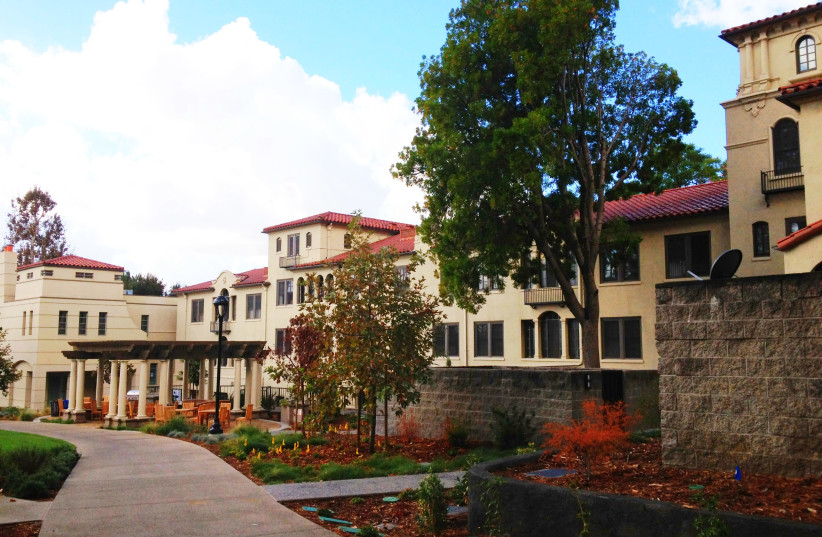
The student government at California-based Pomona College voted unanimously on Thursday on a resolution calling the student union to cut funding for any student government bodies not boycotting companies that “support the Israeli occupation of Palestine.”
The resolution at Pomona, which is one of the colleges in the Claremont College Consortium, was first proposed by Claremont Students for Justice in Palestine (SJP) and Claremont Jewish Voice for Peace (JVP) along with several other student organizations, and includes the eventual cutting of all funds to any clubs that would “knowingly invest or spend their funds of items that contribute to further encroachment into Palestinian occupied territories,” according to the resolution, which was viewed by The Jerusalem Post.In addition, stores managed by the student government, known as the Associated Students of Pomona College (ASPC), will also be prohibited from using and selling products from the boycotted companies, according to student news outlet Claremont Independent.
So far, the ASPC is the second student government in the Claremont Consortium to boycott Israel, following the Pitzer Student Senate at Pitzer College, which did so in 2017.
But the ASPC resolution is different in a number of ways. Most notable among them, however, is its broad scope. The list of companies that Pomona clubs would lose funding if they engaged with them is taken directly from a United Nations Human Rights Council (UNHRC) blacklist released in February 2020. The list itself included 130 businesses, many of whom are among the largest international companies and conglomerates such as General Mills, Expedia, TripAdvisor, Airbnb, Booking.com and Motorola.
As such, given the wide breadth of many of these companies – General Mills, for instance, is among the world’s largest food conglomerates – the number of clubs that may have engaged with them could be very high. And if the list is updated annually as the UNHRC mandated – though High Commissioner for Human Rights Michele Bachelet has said this is not financially feasible – then the number of companies could grow even larger.
Moreover, the resolution would seemingly, in principle, also result in funding cuts to organizations like campus Hillel and Chabad, according to the Algemeiner. This has been disputed by some familiar with the Pomona student government funding structure.
if(window.location.pathname.indexOf(“656089”) != -1){console.log(“hedva connatix”);document.getElementsByClassName(“divConnatix”)[0].style.display =”none”;}
MANY JEWISH organizations have come out against the bill, and have vowed not to abide by it. One organization, Claremont’s Progressive Israel Alliance, has promised not to comply, its president Janie Marcus said in a statement, according to the Algemeiner.
“ASPC has institutionalized a campus-wide ban on the free exchange and purchase of goods and services,” she said, according to the newspaper.
“Moreover, ASPC has particularized and singled out a specific demographic for its discriminatory policy. Not only does this resolution hinder the general student population’s ability to make buying choices of their own volition, but it also sets its eyes on penalizing a particular constituency of students and student groups that provide space for Jewish and Israeli students.”
A cautious response to the bill was also released by Pomona College president G. Gabrielle Starr. In an emailed statement viewed by the Post, Starr noted that the vote was held without any voice from student opposition.
“The independence of student government in passing its resolutions is important, but so is the representation of the student body as a whole – and given the lack of debate and the passions this vote may stir, we want to convey our deep concern,” Starr wrote, adding that she believed this works against dialogue that is “critical for constructive engagement of diverse voices on our campus.”
She urged the ASPC to discuss the issue in greater depth, with opposing voices being allowed to make their case.
“We urge ASPC to reverse course and allow for full discussion, and we welcome an open dialogue on this matter.”
But the bill doesn’t just stop at limiting the college’s student government. Rather, it calls on all Claremont colleges and clubs to follow suit, “with the end goal of an ultimate adoption of a Consortium-wide agreement to ban clubs from using student government allocations to invest in or purchase goods or services from companies that contribute to the settlement and occupation of Palestinian occupied territories by the UN-designated companies or the Israeli state.”
According to Claremont SJP, this resolution is far from the end of their efforts, but is simply an “important first step” in pushing for “the total divestment” from Israel, which it says is the Claremont Consortium’s “responsibility.”
The Boycott, Divestment and Sanctions (BDS) movement, which is at the root of this bill, is widely held to be antisemitic, and is stated as such by both the International Holocaust Remembrance Alliance’s (IHRA) working definition of antisemitism and as recognized by several governments worldwide, such as the US and Germany.
Following the ASPC’s voting on the bill, several Pomona students have started a Change.org petition to condemn it and “protect the Jewish student body.”Tovah Lazaroff and Lahav Harkov contributed to this report.
Related posts:
California Passes Bill to Fund Sex Hormones and Transgender Surgeries for Children
Antisemite of the year: A law student from New York
US House Passes Bill That Would Enhance Reporting on European Anti-Semitism
Democrats Block Rep. Andy Barr's Amendment to Prevent COVID-19 Relief Funds from Going to China
UN Human Rights Council passes resolution calling for suspension of arms sales to Israel
You Won’t Believe Why They Could Withhold Relief Funds from Harvey Victims
Views: 0
 RSS Feed
RSS Feed

















 April 30th, 2021
April 30th, 2021  FAKE NEWS for the Zionist agenda
FAKE NEWS for the Zionist agenda  Posted in
Posted in  Tags:
Tags: 
















